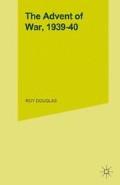Abstract
In the early part of 1939, most critics of the Government treated one proposition as axiomatic. Germany and Russia were implacable enemies. Russia was therefore willing and anxious to join with the Western Democracies, Poland, and any other threatened state in common defence against Germany. If that common defence were not established, it would be the fault of one or more of the other Allies, who refused to give Russia proper consideration as a Great Power, or refused reasonable conditions required by the Soviet Union which were essential for an effective alliance. At the time of Munich — so the story ran — Russia had been cold-shouldered by Britain and France, with disastrous results. This must not happen again!
‘Diplomacy is the art of saying “Good doggie” while you are looking for a stick.’ Anon.
Access this chapter
Tax calculation will be finalised at checkout
Purchases are for personal use only
Preview
Unable to display preview. Download preview PDF.
Author information
Authors and Affiliations
Copyright information
© 1978 Roy Douglas
About this chapter
Cite this chapter
Douglas, R. (1978). Russia: Stage One. In: The Advent of War 1939–40. Palgrave Macmillan, London. https://doi.org/10.1007/978-1-349-16024-2_3
Download citation
DOI: https://doi.org/10.1007/978-1-349-16024-2_3
Publisher Name: Palgrave Macmillan, London
Print ISBN: 978-1-349-16026-6
Online ISBN: 978-1-349-16024-2
eBook Packages: Palgrave History CollectionHistory (R0)

